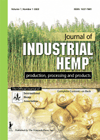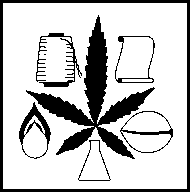
It is once again the sign up season for the International Hemp Association. The invitation posted below was sent out today to prospective members and we thought that it would be appropriate to extend this invitation to all of you as well. You can get the Journal of Industrial Hemp directly from
Haworth Press, but we at The Hemp Report encourage people and companies to join this important organization directly and get the Journal as one of the many benefits.

Please click here to download the
2005 International Hemp Association Membership Application Form. (PDF file 85K)
Sincerely,
Tom Murphy
The Hemp Report
International Hemp Association

Dedicated to the advancement of Cannabis
through the dissemination of information
We would like to take this opportunity to formally invite you to join the International Hemp Association (IHA) and subscribe to our official publication the "Journal of Industrial Hemp" (JIH).
The IHA is a member-supported, non-profit educational organization dedicated to the advancement of
Cannabis through the dissemination of information. In support of this goal the IHA and Haworth Press in New York publish the JIH twice annually.
The JIH contains peer-reviewed scientific and popular articles concerning legal uses of
Cannabis. We welcome submissions from a wide range of disciplines such as agronomy, chemistry, ecology, economics and markets, history, ethnology, geography, genetic resources and breeding, physiology, phytopathology, applications and product development, appropriate technology and current events. We also include conference announcements and reviews, book reviews, museum and regional reports. The JIH is a forum for expanded discussions of scientific topics not available in other journals today. Some authors may wish to publish initially in specialty journals, but definitive review articles and original research with expanded results are particularly welcome in the JIH.
The 19th issue of the JIH will contain a wide variety of articles. The section for peer-reviewed papers opens with a paper by Bócsa, Finta-Korpelová and Máthé presenting results of a breeding programme aiming to increase oil content of hemp seed. The article by Karl Hillig presents a combined analysis of agronomic traits and allozyme allele frequencies for 69
Cannabis accessions. His results may aid plant breeders in choosing parental strains for initial breeding material and may be useful for developing strategies of
Cannabis germplasm conservation.
The contribution by Amaducci, Pelatti and Medeghini Bonatti describes fibre development in hemp. The study shows that important quality characteristics of hemp fibre (i.e. shape, diameter, maturation and quantity of secondary fibre) vary with harvest date, plant density, internode and within the same stem part. Burczyk and Kaniewski, report on a new harvest machine for hemp grown for seed that mows the crop, cuts off the seeded flowers and collects them on a trailer, while the stems are cut in 70 cm long sections and laid down for dew-retting or drying.
The section for non peer-reviewed papers starts with the
Collections Corner, in which Robert Clarke pictures and describes his collection of Hmong/Miao hemp skirts. These traditional skirts are decorated by several methods to create countless variation. Hmong hemp skirts are excellent examples of traditional craft and make attractive collector's items.
This issue's
Wide Wild World of Hemp column, produced by John Dvorak, our in-house hempologist and internet editor, reports on the recent (November 2004) Hemp Industries Association Convention. The overall mood at the convention was upbeat and positive, with stories of robust sales, increasing markets and innovative new products.
In our series
Cannabis Clinic John McPartland and Birgit Rhode present new hemp diseases and pests in New Zealand. New Zealand's hemp suffers attacks from birds, mammals, molluscs, insects, fungi and viruses. This issue also features a
Hemp Production Note by Stefano Amaducci. He presents the production of the so-called baby-hemp, a crop grown at high plant density that is chemically desiccated when a height of 120-140 cm is reached. Advantages, problems and possible solutions for this technique are discussed.
Claudia Greslehner gives a short presentation of the current situation of hemp in Austria. Some original Austrian-made products are presented such as hemp stone and hemp milk. The last item in this issue is a report by Arthur Hanks on the "Canadian Hemp Trade Alliance Annual General Meeting", held in Winnipeg, Canada on October 26, 2004.
In the second issue of 2005 we hope to have articles about fatty acid and tocopherol profiles of hemp in the Canadian prairies, the mechanical properties of bast fibres, the current status of THC in German hemp food products, a report of industrial hemp trials in southern Sweden and an article discussing the influence of genotype on the composition of hemp seed oil.
Detailed in formation on the Journal of Industrial Hemp (e.g. tables of contents, a free pdf sample copy) can be found at
http://www.haworthpress.com/web/JIH/
The IHA is a member service organization staffed by volunteers. We try to answer all requests for Cannabis information. However, we always attend to the needs of our members first.
We encourage JIH subscribers to also join the IHA and receive the additional satisfaction of supporting Cannabis education. Membership fees are used to pay for journals and support office expenses. In addition, IHA members receive a substantial discount over direct subscribers. Businesses should join as sustaining members and will be listed under their business name in our membership directory, available upon request.
All 2005 IHA members will receive two issues of the JIH at a reduced price:
Students - 30 Euros or 35 US$ (35% Discount for IHA members)
Individuals - 40 Euros or 45 US$ (15% Discount for IHA members)
Businesses/Institutions - 75 Euros or 85 US$ (25% Discount for IHA members)
Libraries and agencies should contact Haworth Press directly to enquire about rates.
The JIH will begin Volume 10 in 2005. JIH back issues are not posted on the web. However, the first six volumes of the "Journal of the International Hemp Association" can be viewed by searching for "
International Hemp Association" in Google.
We look forward to hearing from you soon!
International Hemp Association,
Postbus 75007,
1070 AA Amsterdam,
The Netherlands
Email:
IHA@euronet.nl
www.internationalhempassociation.org

Case for Hemp Made at American Farm Bureau Convention
U.S. Farmers Deserve Right to Grow Industrial Hemp for Global Demand
CHARLOTTE, NC - Representatives of the Hemp Industry will exhibit on January 9-12 at the
American Farm Bureau Federation's (AFBF)
annual convention at the
Charlotte Convention Center to educate farmers about the need to change federal laws that prevent them from growing industrial hemp.
Vote Hemp (booth # 614), a non-profit advocacy organization, will give away hemp food and display a wide variety of hemp products, such as automobile parts and paper, sold in the U.S. but made with imported industrial hemp.
"The U.S. government treats hemp the same as marijuana even though dozens of countries including Canada, England and Germany understand the difference. American farmers know that hemp isn't a drug. What we will show them is that there is a global market for industrial hemp that they are unfairly locked out of," says Eric Steenstra, President of Vote Hemp, who will attend the AFBF convention. "The American Farm Bureau Annual Convention is the perfect place for Vote Hemp to jump-start our legislative and education efforts by networking with farmers from across the country who want to grow industrial hemp."
Vote Hemp's ultimate goal is to free industrial hemp from restrictions meant for marijuana, so that U.S. farmers and business owners can once again profit from hemp's commercial cultivation. Vote Hemp is working with legislators on the introduction of an Industrial Hemp Farming Act. In January, when the 109th Congress convenes, Vote Hemp will focus lobbying efforts on bills to be introduced in the U.S. House of Representatives and Senate.
"Farmers are asking, if it's legal to sell hemp here in the U.S., why can't we grow it commercially? Automobile parts, paper, clothing, food, personal care products, and more are all being made from hemp, yet the American farmer is left out of the expanding marketplace, now estimated at more than $200 million in annual North American retail sales," says Steenstra.
In February 2004 the Hemp Industries Association
won its three year legal battle against the Drug Enforcement Administration's misguided attempt to ban safe and nutritious hemp foods. The market for hemp seed and oil products that the DEA tried to ban is now among the fastest growing natural health food markets in the natural products industry which itself is among the fastest growing sectors of the US economy.
"More and more health foods containing omega-3 rich hemp nut and oil are appearing on store shelves since the legal status is no longer an issue," says Alexis Baden-Mayer, Director of Government Affairs for Vote Hemp. "Americans are looking for healthy alternative sources of omega-3 to supplement their diets due to concerns regarding trace mercury in fish and fish oil supplements. Right now the U.S. marketplace is supplied with hemp seed grown and processed in Canada and Europe. We are working to convince Congress it is time for the U.S. to again allow American farmers to grow industrial hemp so that they can participate in this lucrative growth market."

![]()
![]()
